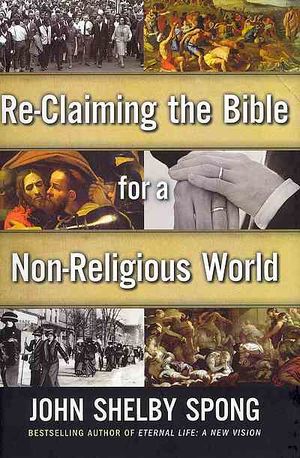Re-Claiming the Bible for a Non-Religious World (2011 Spong), book
John Shelby Spong, Re-Claiming the Bible for a Non-Religious World (New York, NY: HarperOne, an imprint of HarperCollins Publishers, 2011).
Abstract
"Explores the origin and meaning of each book of the Bible, arguing that the text should not be regarded as authoritative and instead should be open to interpretation to accommodate the ever-changing modern world ... In Re-Claiming the Bible for a Non-Religious World, bishop and social activist John Shelby Spong argues that 200 years of biblical scholarship has been withheld from lay Christians. In this brilliant follow-up to Spong’s previous books Eternal Life and Jesus for the Non-Religious, Spong not only reveals the crucial truths that have long been kept hidden from the public eye, but also explores what the history of the Bible can teach us about reading its stories today and living our lives for tomorrow ... Sarah Sentilles, author of Breaking Up With God: A Love Story, applauds John Shelby Spong’s Reclaiming the Bible for a Non-Religious World, writing that “pulsing beneath his brilliant, thought-provoking, passionate book is this question: can Christianity survive the education of its believers?…A question Bishop Spong answers with a resounding yes.”"--Publisher description.
Contents
Setting the stage : posing the problem. Examining the Bible's mystique -- The formation of the Torah. Breaking open the Books of Moses ; The Yahwist document : the original narrative ; The Elohist document : the Torah expands ; The Deuteronomic writers : the third strand of the Torah ; The priestly document : the fourth strand of the Torah -- The rise of the prophets. The transitional books : Joshua, Judges, and Samuel ; The story of Nathan : all are subject to the law ; I and II Kings, Elijah and Elisha : step two in the prophetic tradition -- Introducing the writing prophets. The prophetic principle : ancient and modern ; The Isaiahs I, II, and III ; Jeremiah : prophet of doom ; Ezekiel : prophet of the exile ; Daniel : misplaced but potent -- The minor prophets : the book of the twelve. Hosea : the prophet who changed God's name to love ; Amos : the prophet who changed God's name to justice ; Micah : the prophet who turned liturgy into life ; Jonah : definer of prejudice ; I and II Zechariah : shapers of the Jesus story ; Malachi : the dawn of universalism -- The Bible's protest literature. Job : icon of a new consciousness ; Ruth : the myth of racial purity -- Liturgical books and wisdom literature. The book of Psalms ; Wisdom literature : Proverbs, Ecclesiastes and the Song of Solomon ; Lamentations and Esther : books designed for liturgical observances ; The chronicler, Ezra and Nehemiah : national mythmakers -- Introducing the Christian scriptures, commonly called the New Testament. A new beginning--an old theme ; Dating the historical Jesus ; Dating the New Testament in relation to the life of Jesus ; The oral period -- Paul : the first New Testament writer. The witness of Paul ; Paul's secret thorn ; Paul's early Epistles : I Thessalonians and Galatians ; The Corinthian Letters ; Resurrection according to Paul ; Resurrection through Jewish eyes ; Romans : the Gospel of Paul ; The theology of Paul as revealed in Romans ; Who is Christ for Paul? The Gospel in Romans ; The elder Paul : Philemon and Philippians ; Post-Pauline Epistles : II Thessalonians, Colossians and Ephesians -- The synoptic Gospels. Exploring Mark : the original Gospel ; Mark's use of synagogue worship patterns ; Mark's first narrative of the Crucifixion : a Passover format ; Matthew : the most Jewish Gospel ; Matthew's interpretive secret ; Matthew and the liturgical year of the synagogue ; Luke : moving toward the Gentile world ; Luke's vision of universalism ; Acts : the spirit that embraces the world and drives toward wholeness ; Paul and early Christians as viewed through Acts -- The pastoral Epistles, Hebrews and the general Epistles. I and II Timothy and Titus : "We have the truth!" ; The Epistle to the Hebrews ; The general Epistles : James, I and II Peter and Jude -- The Johannine corpus. Introducing the Johannine material ; The Gospel of John : not a literal book ; The raising of Lazarus and the identity of the beloved disciple ; The epilogue of John ; The Johannine Epistles and the Book of Revelation.
